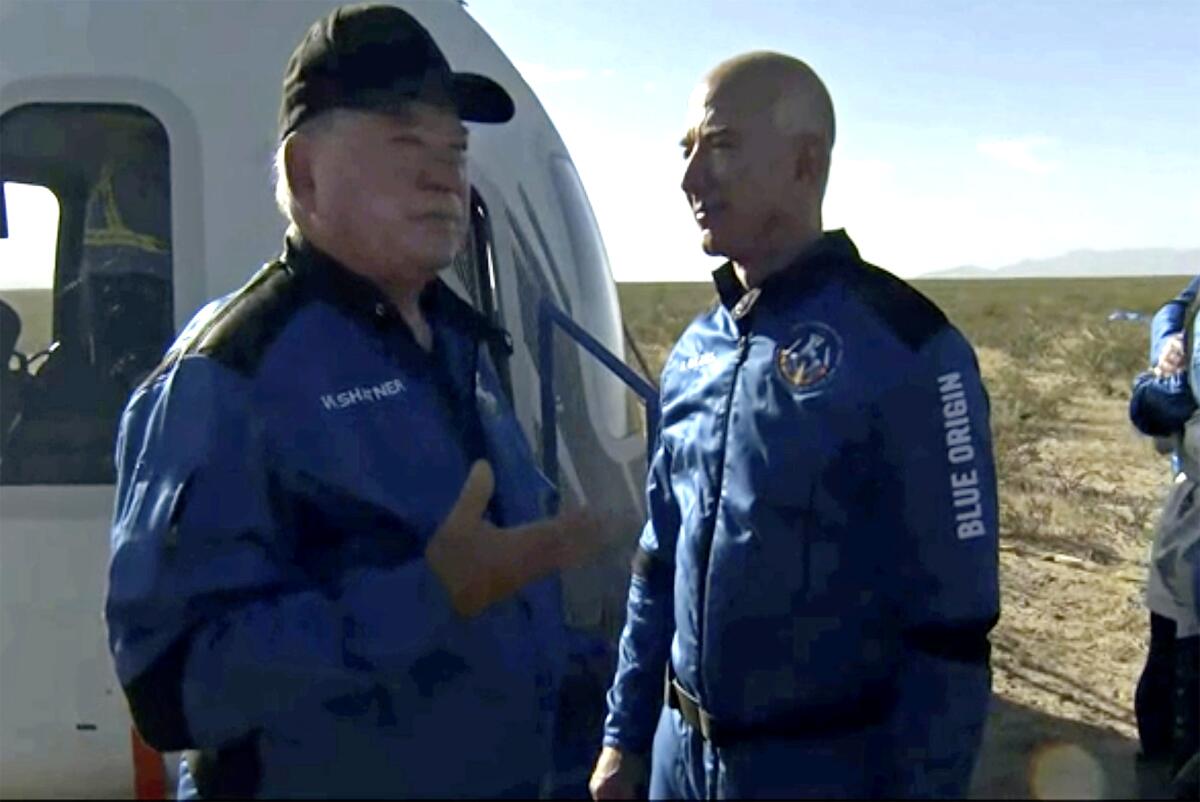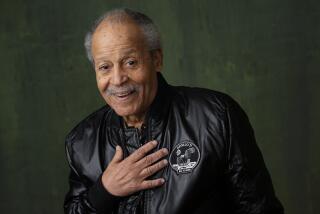Opinion: Some thoughts on final frontiers, upon William Shatner’s return from space

- Share via
William Shatner was at a loss for words.
It was an uncharacteristic state of affairs for the loquacious 90-year-old actor, recording artist and TV pitchman, although cut him some slack. He had just been rocketed more than 65 miles into the sky and then, with his three Blue Origin spacecraft companions, touched down gently in Texas. It took his breath away. For a little while.
And then they just couldn’t shut him up. You could almost sympathize with Jeff Bezos, the billionaire founder of the spaceflight company, whose ear Shatner bent with his impressions of the short flight Wednesday morning.
“Was that death?” he asked about the blackness of space he saw before him. “Is that the way death is? Whoop and it’s gone. Jesus. It was so moving to me.”
Amid violence, political unrest and a continuing pandemic, 2021 has been the year of space tourism for the rich and famous. Most passengers have paid for their rides on suborbital capsules launched by companies led by Bezos and fellow billionaires Richard Branson and Elon Musk. But in a savvy publicity move, Bezos invited TV’s Capt. James T. Kirk to ride as a guest.
It was a sort of closing of the circle for baby boomers, who grew up reading (and believing!) books like “You Will Go to the Moon,” watching sci-fi movies in which rockets not only blasted off but touched down back on Earth, and following the adventures of Kirk, Spock, Uhura and all the others in deep, imaginary outer space.
As we grew up, space was different, if still exciting. Rockets didn’t land, but fell into the ocean as expensive waste. The promise that we, ourselves, would go to the moon was broken. But a handful of Americans did go, and they described their voyages for us not like breathless travelers but like the military men and engineers they were.
But the very brief moon age ended with Apollo 17 just before Christmas in 1972.
We grew older, and just as the vast majority of us came to terms with the realization that we would never be professional baseball players, rock stars or senators, we let go of our space traveler dreams.
Oh, sure, some older folks might get a shot. John Glenn, the first American to orbit the planet, hero of our childhood, got a second ride into space at 77. But then, he really was a U.S. senator, as well as an astronaut.
As people of my generation grew older we came to realize two things: We would not go to space; and there is, instead, a very different final frontier we’d prefer not to think about.
Yet here is this 90-year-old man, from the pre-boomer generation, standing next to a capsule fitted with large, tourist-oriented picture windows.
So despite all the legitimate questions about a handful of billionaires using all these resources to send rich, famous or lucky tourists into space, this one aging boomer and cancer survivor salutes Capt. Kirk. And all the other space tourists too, including Hayley Arceneaux, the cancer survivor who a month earlier became at 29 the youngest American in space.
In 1936, five years after Shatner’s birth, the movie “Things to Come” appeared in theaters. Based on the work of science fiction writer H.G. Wells, it depicted a struggle between the human desires for exploration and comfort. Will there never be any rest, one of the characters asks, after a rocket sends his child into space?
Rest enough for the individual man, his companion responded. “But too much, and too soon, and we call it death.”
The line comes to mind after hearing Shatner’s words upon landing — words unmatched by any of those military men launched into space by NASA decades ago.
“Blue down there, and the black up there,” he said. “Here is mother and Earth and comfort and there is — is there death?
Is there death? Not for now, there isn’t. Not today. Not for dreams, or the drive to make them come true.
More to Read
A cure for the common opinion
Get thought-provoking perspectives with our weekly newsletter.
You may occasionally receive promotional content from the Los Angeles Times.











